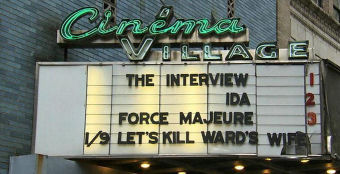Close window | View original article
Sony's 50 Shades of Gray
Free speech is important, but is portraying murder really good?
The Wall Street Journal reports that Sony Pictures' movie The Interview is being shown in 331 small theaters:
The comedy about the assassination of North Korea's ruler, Kim Jong Un, was yanked by Sony Pictures last week after big theater chains refused to play it. The decision followed a cyber attack at the Sony Corp. unit, which the U.S. blamed on North Korea, and a terrorist threat against theaters that played the film.
President Obama announced that the cyber attack against Sony had been traced to North Korea and declared that there would be retribution, even though the North Korean government denied involvement. Perhaps coincidentally, perhaps not, the nation of North Korea was cut off from the Internet for several hours or several days, depending on which news source you read.
All the hooraw about the Sony emails which the hackers posted on any site that would display them, and all the concern about freedom of speech and whether it's a good idea for a large corporation to submit to foreign threats, has obscured the main point - is it really a good idea to make a "comedy" about assassinating a foreign head of state? Is assassination funny? Is murder, that is, the willful killing of a human being, something to joke about?
We believe deeply in freedom of speech. Anyone who truly believes in it must allow, and uphold, speech which is disagreeable, offensive, odious, and nauseating. On this basis, therefore, we defend Sony and The Interview as an exercise of this fundamental right despite our qualms.
This is in stark contrast to our liberal elites claim to believe not only in freedom of speech but also in academic freedom, but they're doing their best to suppress speech they don't like:
- The State of Wisconsin has conducted secret searches of the offices and emails of conservative political organizations in order to inhibit Gov. Walker's supporters.
- Many conservative speakers have been disinvited from making commencement addresses at liberal universities.
- The Obama IRS appointees gave conservative political groups a very hard time.
As supporters of freedom of speech, we agree that Sony has the unconditional right to make any movie they desire. We still can't help wondering if treating assassination as a laughing matter is a good idea.
The Death of Civility
There was a time when what Rush Limbaugh calls "adult language" could not appear in movies. There was a time when sexual behavior was only hinted at and determined voyeurs had to travel to Europe to see uncut segments of movies which had been trimmed for the American market.
During World War II, cartoonists ridiculed Hitler and Mussolini, but didn't advocate assassination. Cartoon Hitler received many pies and tomatoes to the face but rarely if ever a bullet.

60 years on, we have martial arts movies which show people killing people with their bare hands. We've seen endless cartoon violence and black magic, particularly in Disney movies. One theater playing The Interview advertises a coming movie, Let's Kill Ward's Wife. Have movies about murder become that common?
Sony's The Interview isn't even the first movie about assassinating a head of state - that "honor" goes to Death of a President, which described the murder of President George W. Bush. Canada, where the movie was produced, wasn't threatened with having its theatres bombed.
Do Messages Matter?
In other news, two New York City police officers were murdered by a man who'd posted Facebook messages expressing indignation at the deaths of Eric Garner and Michael Brown who died while resisting arrest. The chattering classes claimed that protesters chanting "What do we want? Dead cops. When do we want them? Now!" had nothing to do with the murders. How, they ask, could such legitimate and worthwhile protest against widespread injustice drive a mentally disturbed person to commit murder?
At the same time, most incidents of the misuse of guns bring down a wave of liberal blame on all honest gun owners whose constitutionally-sanctioned "gun culture" is said to drive mentally disturbed persons to commit murder. Do such messages matter?
Our concern about Sony's making a joke of murder continues our concern about other forms of violence which are shown freely in our society:
- When a young man who was addicted to playing Grand Theft Auto (GTA) murdered a taxi driver to see if the methods shown in the game would actually work, the Thai government banned further sales of GTA. Are concerns about video game violence warranted?
- Do the explicit messages about rape and murder in rap music encourage rape and murder? Or are they legitimate examples of artistic expression which only hard-core racists would criticize?
- Do books like 50 Shades of Gray, which describe a woman being so delighted by strong-arm sex that she married the man who did it, encourage a "rape culture" by suggesting that women secretly desire to be coerced and that "No" really means "You haven't forced me hard enough yet"?
- Do movies about assassinating leaders and murdering Ward's wife encourage murder?
- Do leaders who assure everyone that police systematically abuse black people encourage crime, arson, and violence?
People who spend large amounts of money advertising products on TV believe that widely-repeated repeated messages influence behavior. Are we right to be concerned about Sony's message that trivializes assassination?